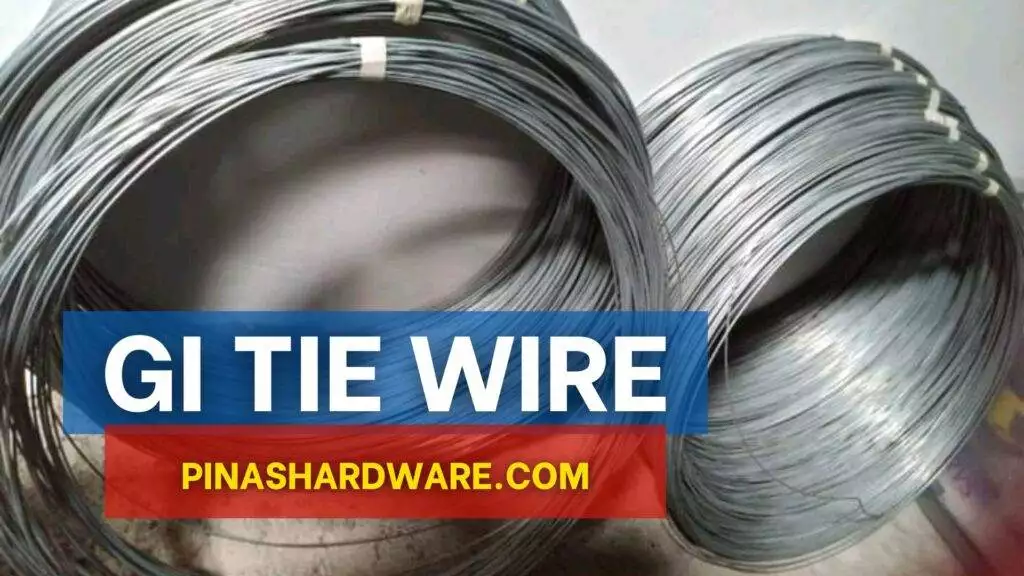GI tie wire, short for galvanized iron tie wire, also known as “Alambre” in tagalog, is a type of wire made of iron wire that has been coated with a layer of zinc to protect it from rust and corrosion and is commonly used in construction and industrial applications for tying and securing objects together. This material has become popular for most DIY enthusiasts due to its durability and strength, making it one of the best options for applications where a strong, long-lasting tie is required.
GI Tie Wire Prices
GI tie wire prices can vary depending on its diameter and weight. On average, it can cost from ₱2,205.00 to ₱2,380.00 per 35 kg.
| Details | Wire Diameter | Weight per roll | Prices |
| GI Tie Wire Prices | #4 | 35 kgs | ₱2,310.00 |
| GI Tie Wire Prices | #6 | 35 kgs | ₱2,310.00 |
| GI Tie Wire Prices | #8 | 35 kgs | ₱2,310.00 |
| GI Tie Wire Prices | #10 | 35 kgs | ₱2,310.00 |
| GI Tie Wire Prices | #12 | 35 kgs | ₱2,310.00 |
| GI Tie Wire Prices | #14 | 35 kgs | ₱2,310.00 |
| GI Tie Wire Prices | #16 | 35 kgs | ₱2,205.00 |
| GI Tie Wire Prices | #18 | 35 kgs | ₱2,380.00 |

Advantages of GI Tie Wire
Corrosion Resistance – The galvanized coating on GI tie wire provides excellent corrosion resistance, making it suitable for outdoor and marine applications where exposure to moisture and harsh environments is common.
Strength – The strength and durability of GI tie wires can provide a secure hold when tying and securing objects together with a lesser chance of breaking and snapping compared to uncoated iron wire.
Versatility and Longevity – The galvanized coating on GI tie wire not only helps extend its lifespan but also provides it with versatility, making it usable in a wide range of applications, including construction, agriculture, and industrial settings.
Disadvantages of GI Tie Wire
Sharp Edges – The ends of GI tie wire can have sharp edges that can cause injury if not handled properly, which is why it is important to use gloves or other protective gear when working with GI tie wire to avoid cuts and abrasions.
Difficult to Work With – GI tie wire can be more difficult to bend and manipulate compared to softer materials, which makes it more difficult to use, especially in certain applications that require intricate work.
Potential for Zinc Poisoning – While this case is considered rare, prolonged exposure to zinc from galvanized coatings can lead to zinc poisoning, which can cause symptoms such as nausea, vomiting, and diarrhea.
FAQs
What is a GI tie wire?
GI tie wire, or galvanized iron tie wire, is a type of wire known for its corrosion-resistant properties, due to a layer of zinc coating that protects it from corrosion.
What is tie wire?
Tie wire is primarily used in applications that require securing objects or bundling materials, such as in construction and gardening. Also, it is very popular when called alambre in the Philippines.
What is the difference between GI tie wire and tie wire?
The main difference between GI tie wire and regular tie wire is that GI tie wire has been galvanized to make it more resistant to corrosion giving it added durability and lifespan.
Is GI tie wire durable?
Yes, GI tie wire is durable and resistant to corrosion, thanks to its galvanized coating.
Does GI tie wire rust?
While GI tie wire is more resistant to rust than regular wire, it is not completely immune to corrosion.

